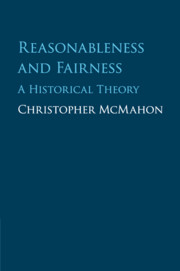Introduction
Published online by Cambridge University Press: 24 November 2016
Summary
The concept of the reasonable, and the close connection between reasonableness and fairness, feature importantly in the theory of political liberalism developed by John Rawls. He says, for example, “Persons are reasonable in one basic aspect when, among equals say, they are ready to propose principles and standards as fair terms of cooperation, and to abide by them willingly, given the assurance that others will likewise do so.” The concept of the reasonable also occupies a prominent place in the theory of moral right and wrong proposed by T. M. Scanlon. In a familiar passage, he says that “an act is wrong if its performance under the circumstances would be disallowed by any set of principles for the general regulation of behavior that no one could reasonably reject as a basis for informed, unforced general agreement.”
But despite the central role given to reasonableness by two of the leading moral philosophers of our time, and the connection between it and fairness stressed by Rawls, I don't believe that either concept is wellunderstood. In this book, I attempt to remedy this deficiency. The focus is on the employment of these concepts in cooperative contexts. Bringing a cooperative arrangement into existence will normally require some or all of the parties to make concessions. When we characterize a cooperative arrangement as fair, we are saying that the concessions the parties make in realizing it are appropriate.
The concept of the reasonable is more complicated. Moral theories employing this concept have suffered from a failure to distinguish two different senses that it can possess: reasonableness in the competence sense and reasonableness in the concession sense. When we say, for example, that a conclusion is reasonable, we are using the concept in the competence sense. We are saying that competent reasoning could result in acceptance of the conclusion. Often when a conclusion is said to be reasonable, there is an implication that competent reasoning could support other conclusions as well. Reasonableness in the competence sense has no essential connection with cooperative contexts.
But we also use the concept of the reasonable to mark appropriate concession. When we say to someone, “Be reasonable,” we are calling upon him to make a concession. The difference between reasonableness in the concession sense and fairness lies in the contexts where they play their characteristic roles.
- Type
- Chapter
- Information
- Reasonableness and FairnessA Historical Theory, pp. 1 - 18Publisher: Cambridge University PressPrint publication year: 2016

